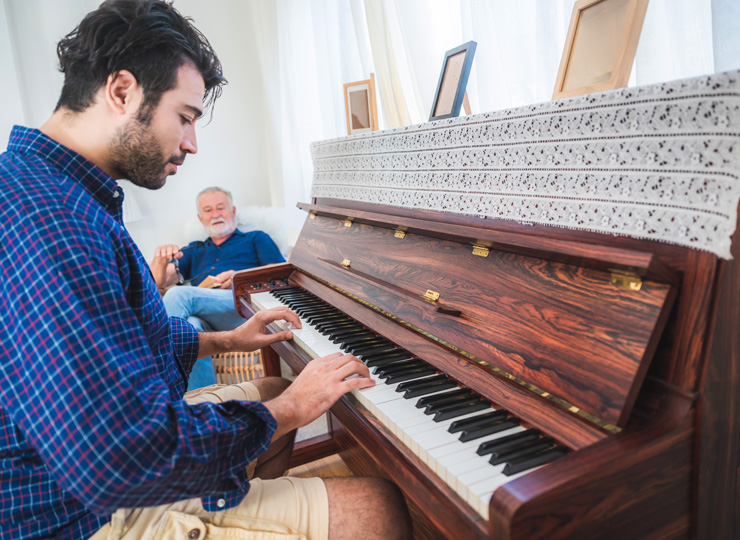
February 21, 2024
Playing a musical instrument or singing in a choir may help to keep the brain sharp, a new study found. And the longer you continue to incorporate music into your life, the greater the potential benefits.
Playing the piano seemed to have the greatest benefits for brain health, though woodwinds, brass and other instruments had beneficial effects. Singing in a choir or other group also led to improvements in tests of thinking skills.
For the study, researchers in the U.K. followed more than 11,000 adults aged 40 and older for about 10 years. All were part of a larger study called PROTECT that has been tracking brain health over many years.
The researchers found that lifetime exposure to music, either through playing an instrument or singing with a group, was linked to improved scores on memory and thinking tests. Those who played an instrument scored particularly high on executive function, the set of abilities that allow you to get a task done and to suppress inappropriate behaviors. Executive function is severely impaired by Alzheimer’s disease. Those who continued to play or sing throughout life tended to have the best outcomes. Just listening to music, however, did not appear to have the same benefits.
“Our PROTECT study has given us a unique opportunity to explore the relationship between cognitive performance and music in a large cohort of older adults,” said the study’s senior author, Anne Corbett, professor of dementia research at the University of Exeter. “Overall, we think that being musical could be a way of harnessing the brain’s agility and resilience, known as cognitive reserve.”
Cognitive reserve refers to the brain’s ability to grow and maintain a rich network of neurons and connections between these neurons. Later in life, this robust network may help to compensate for the loss of brain cells that occurs with Alzheimer’s disease, the theory goes.
Playing an instrument and reading music is an intellectually challenging task. Mental stimulation, through various activities such as doing crossword puzzles, reading a book, or having an intellectually challenging job, has been shown in earlier research to help keep the brain sharp.
Singing in a choir also provides social stimulation, the authors note. Numerous studies have shown that social interaction and engagement is critical for healthy aging.
“Our findings indicate that promoting musical education would be a valuable part of public health initiatives to promote a protective lifestyle for brain health, as would encouraging older adults to return to music in later life,” Dr. Corbett said. The study was published in the International Journal of Geriatric Psychiatry.
The findings are consistent with earlier research showing that music can improve cognitive skills throughout life, and perhaps lower the risk of developing Alzheimer’s disease. Children who take music lessons tend to show an increase in IQ scores and improved reading and concentration abilities, regardless of their socioeconomic backgrounds. Other studies have found that people over 65 who still play music have better executive function, and current and former musicians performed better on tests of language, attention and processing speed compared with their peers who have never played music.
Music may also have benefits for those who already have serious memory problems. Previous studies have shown nursing home residents with dementia who listened to music they enjoyed, often songs from their distant past, had fewer signs of agitation, aggression and other behavioral issues than residents who didn’t get music therapy. Singing or playing a musical instrument also led to a small but significant boost in memory and thinking skills in those with serious memory problems.
By diminishing challenging behaviors, music can also help to ease the burden for caregivers. If you’re caring for a loved one with Alzheimer’s, play favorite music or songs from their childhood or young adult years, and have them clap or sing along. Many senior care centers and Alzheimer’s support groups hold music and sing-along sessions in communities nationwide.
By ALZinfo.org, The Alzheimer’s Information Site. Reviewed by Eric Schmidt, Ph.D., Fisher Center for Alzheimer’s Research Foundation at The Rockefeller University.
Source: Gaia Vetere, Gareth Williams, Clive Ballard, et al: “The relationship between playing musical instruments and cognitive trajectories: Analysis from a UK ageing cohort.” International Journal of Geriatric Psychiatry, February, 2024











